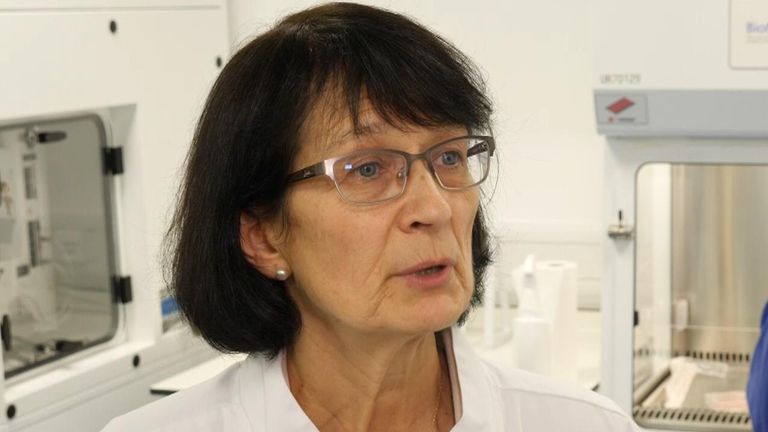COVID once again seems to be everywhere: numbers are up, variants are circulating, boosters are being brought forward and the government is planning to restart surveillance.
What do all of these things mean – and should you be worried?
Here’s what you need to know.
Read more: How COVID surveillance is being stepped up
Infections are up
More than 1 million people in the UK currently have symptomatic COVID, according to estimates from the ZOE Health Study.
The ongoing study, run by King’s College London, uses data from app users to predict infection rates across the country.
It shows numbers have been building from a low in July. Around 1,169,195 people in the UK are estimated to have COVID – the biggest number since 17 April 2023, when approximately 1,178,340 were infected.
Data for 2 September shows 93,432 new daily cases across the UK.
The infection rate is highest in Edinburgh, where approximately one in 10 people have the virus.
There are no longer any official estimates of COVID-19 rates among the UK population, making it difficult to get a full and reliable picture of the spread of the virus.
Testing for COVID-19 has also been scaled back sharply, including across the NHS, so there is not as much data available for analysis.
Hospital admissions are one way of seeing what is happening with the virus.
Latest figures show the number of people in hospital with COVID-19 in England has reached a three-month high, with 3.4 admissions per 100,000 people in the week to 27 August.
It is too early to determine if the rise is linked to the new variant, with other factors – like increased socialising – also possible contributors.
The overall numbers also remain well below those seen in the spring (10.5 per 100,000) and last Christmas (11.8).
This content is provided by Spreaker, which may be using cookies and other technologies.
To show you this content, we need your permission to use cookies.
You can use the buttons below to amend your preferences to enable Spreaker cookies or to allow those cookies just once.
You can change your settings at any time via the Privacy Options.
Unfortunately we have been unable to verify if you have consented to Spreaker cookies.
To view this content you can use the button below to allow Spreaker cookies for this session only.
Click to subscribe to the Sky News Daily wherever you get your podcasts
Better data is coming
Plans are under way to restart COVID surveillance ahead of winter, the UKHSA has said.
The weekly ONS infection survey stopped in March after almost three years of providing weekly data on levels of the virus across the UK.
The UKHSA is yet to announce what surveillance over the winter will look like, but there will be no ramping up of routine testing.
What about COVID vaccines?
The rollout of vaccines was brought forward due to concerns about a new variant, and from 11 September high-risk groups will start getting a seasonal booster.
But there’s strict criteria for who is eligible. Over-65s, frontline health workers, people with immunosuppression and those in clinical risk groups are among those who can get the jab.
Read more:
Man’s legs turn blue in rare long COVID case
Scotland brings forward COVID jabs
Please use Chrome browser for a more accessible video player

0:26
World faces ‘rising risk’ of pandemics
What are the latest variants circulating?
BA.2.86 is the most concerning variant since Omicron emerged, NHS officials have said.
Nicknamed Pirola, it was first detected in the UK in mid-August, when the UKHSA said it could already be causing “significant community transmission”.
The variant sparked the acceleration of the vaccine programme.
The reason scientists concerned are its high number of mutations: 33 to be exact. We’re yet to see what the mutations mean for the variant’s ability to make people sick.
“Having changed their shape, they may become more infectious, they may become more disease-causing,” Dr Bharat Pankhania, an infectious disease control expert from the University of Exeter, told Sky News.
“On the other hand, they may not. We just don’t know yet,” he said.
EG.5, also known as EG.5.1 or Eris, was designated as a ‘variant of interest’ by the World Health Organisation (WHO) in mid-August after it was reported in 51 countries.
WHO said it had not found an increase in disease severity compared to variants we’ve seen previously.
But it said it does have a growth advantage and immune escape properties, which means it can evade natural or vaccine-based immunity.
BA.6 has been dubbed Pi, although it hasn’t been given that name officially (in fact, no COVID variants have been given a Greek letter name since Omicron – the variants since have been considered its descendents).
It has been detected in Denmark and Israel, and also has dozens of mutations.
What should I do if I have COVID?
There are no longer any COVID restrictions in the UK.
However, the government still says you should try to stay at home if you have COVID.
Free tests are no longer available to most people but can be bought at pharmacies.







